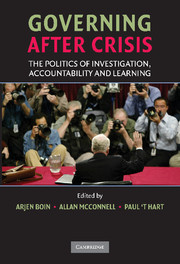Crossref Citations
This Book has been
cited by the following publications. This list is generated based on data provided by Crossref.
McConnell, Allan
Gauja, Anika
and
Botterill, Linda Courtenay
2008.
Policy Fiascos, Blame Management and AWB Limited: The Howard Government's Escape from the Iraq Wheat Scandal.
Australian Journal of Political Science,
Vol. 43,
Issue. 4,
p.
599.
Nohrstedt, Daniel
2008.
The Politics of Crisis Policymaking: Chernobyl and Swedish Nuclear Energy Policy.
Policy Studies Journal,
Vol. 36,
Issue. 2,
p.
257.
MCCONNELL, ALLAN
2008.
Ripples Not Waves: A Policy Configuration Approach to Reform in the Wake of the 1998 Sydney Water Crisis.
Governance,
Vol. 21,
Issue. 4,
p.
551.
Capelos, Tereza
and
Wurzer, Johannes
2009.
United Front: Blame Management and Scandal Response Tactics of the United Nations.
Journal of Contingencies and Crisis Management,
Vol. 17,
Issue. 2,
p.
75.
Deverell, Edward
2009.
Crises as Learning Triggers: Exploring a Conceptual Framework of Crisis‐Induced Learning.
Journal of Contingencies and Crisis Management,
Vol. 17,
Issue. 3,
p.
179.
Lodge, Martin
2009.
The Public Management of Risk: The Case for Deliberating among Worldviews.
Review of Policy Research,
Vol. 26,
Issue. 4,
p.
395.
Boin, Arjen
2009.
The New World of Crises and Crisis Management: Implications for Policymaking and Research.
Review of Policy Research,
Vol. 26,
Issue. 4,
p.
367.
BOIN, ARJEN
HART, PAUL ‘T
McCONNELL, ALLAN
and
PRESTON, THOMAS
2010.
LEADERSHIP STYLE, CRISIS RESPONSE AND BLAME MANAGEMENT: THE CASE OF HURRICANE KATRINA.
Public Administration,
Vol. 88,
Issue. 3,
p.
706.
NOHRSTEDT, DANIEL
and
HANSÉN, DAN
2010.
CONVERGING UNDER PRESSURE? COUNTERTERRORISM POLICY DEVELOPMENTS IN THE EUROPEAN UNION MEMBER STATES.
Public Administration,
Vol. 88,
Issue. 1,
p.
190.
Nohrstedt, Daniel
and
Weible, Christopher M.
2010.
The Logic of Policy Change after Crisis: Proximity and Subsystem Interaction.
Risk, Hazards & Crisis in Public Policy,
Vol. 1,
Issue. 2,
p.
1.
Sulitzeanu-Kenan, Raanan
2010.
Reflection in the Shadow of Blame: When Do Politicians Appoint Commissions of Inquiry?.
British Journal of Political Science,
Vol. 40,
Issue. 3,
p.
613.
GOLDFINCH, SHAUN
and
WALLIS, JOE
2010.
TWO MYTHS OF CONVERGENCE IN PUBLIC MANAGEMENT REFORM.
Public Administration,
Vol. 88,
Issue. 4,
p.
1099.
Stark, Alastair
2010.
Legislatures, Legitimacy and Crises: The Relationship Between Representation and Crisis Management.
Journal of Contingencies and Crisis Management,
Vol. 18,
Issue. 1,
p.
2.
Boin, Arjen
Hart, Paul 't
McConnell, Allan
and
Preston, Thomas A.
2010.
Leadership Style, Crisis Response and Blame Management: The Case of Hurricane Katrina.
SSRN Electronic Journal,
Boin, Arjen
and
't Hart, Paul
2010.
Organising for Effective Emergency Management: Lessons from Research1.
Australian Journal of Public Administration,
Vol. 69,
Issue. 4,
p.
357.
Larsson, Larsåke
2010.
The Handbook of Crisis Communication.
p.
713.
Boin, Arjen
and
Fishbacher-Smith, Denis
2011.
The importance of failure theories in assessing crisis management: The Columbia space shuttle disaster revisited.
Policy and Society,
Vol. 30,
Issue. 2,
p.
77.
Adshead, Maura
2011.
An Advocacy Coalition Framework Approach to the Rise and Fall of Social Partnership.
Irish Political Studies,
Vol. 26,
Issue. 1,
p.
73.
Eriksson, Kerstin
and
McConnell, Allan
2011.
Contingency planning for crisis management: Recipe for success or political fantasy?.
Policy and Society,
Vol. 30,
Issue. 2,
p.
89.
Cantelli, Fabrizio
Kodate, Naonori
and
Krieger, Kristian
2011.
Towards democratic governance of uncertainty? Contesting notions of participation, control and accountability.
Journal of Risk Research,
Vol. 14,
Issue. 8,
p.
919.



